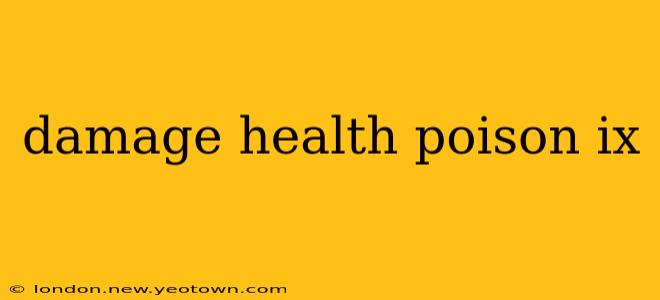The Silent Killers: Understanding the Health Impacts of Poisoning
Imagine this: you're enjoying a relaxing evening, unaware that a silent threat lurks nearby. It might be a seemingly harmless plant, a contaminated food source, or even a seemingly innocuous household chemical. This is the chilling reality of poisoning, a serious health issue that affects millions worldwide. This article delves into the insidious world of poisons and their devastating impact on human health.
We'll explore the various types of poisons, the mechanisms of their toxicity, and the crucial steps to take in case of accidental or intentional exposure. We'll also unpack common myths surrounding poison and discuss the critical role of prompt medical attention in mitigating the damage.
What are the different types of poisons?
Poisons come in many forms, making identification and treatment challenging. We can broadly categorize them as follows:
-
Toxins: These are poisonous substances produced by living organisms, such as plants (e.g., poison ivy, hemlock), animals (e.g., snake venom, scorpion stings), and bacteria (e.g., botulism toxin). Their effects vary widely depending on the source and the amount of exposure.
-
Venoms: These are toxins that are injected into the body, typically through bites or stings. Venoms often contain complex mixtures of proteins and enzymes that can disrupt various bodily functions.
-
Chemical Poisons: These encompass a vast range of synthetic compounds, including pesticides, herbicides, industrial chemicals, and pharmaceuticals. Accidental ingestion or inhalation of these substances can cause serious health problems, ranging from mild irritation to organ failure.
-
Biological Poisons: Beyond toxins produced by organisms, biological agents like certain types of bacteria, viruses, or fungi can also cause poisoning. Think of foodborne illnesses caused by Salmonella or E. coli, or mycotoxins from moldy foods.
What are the common symptoms of poisoning?
Recognizing the signs of poisoning is critical for timely intervention. Symptoms can vary drastically depending on the type and amount of poison ingested or absorbed. However, some common indicators include:
- Nausea and Vomiting: These are frequent initial responses to many types of poisons.
- Diarrhea: Similar to nausea and vomiting, this can be a sign the body is trying to expel the poison.
- Abdominal Pain: This can range from mild discomfort to severe cramping, depending on the severity of the poisoning.
- Dizziness and Weakness: These symptoms often indicate the poison's impact on the central nervous system.
- Difficulty Breathing: This is a serious sign that requires immediate medical attention.
- Changes in Heart Rate or Blood Pressure: These indicate the poison's effect on the cardiovascular system.
- Seizures: These are a severe symptom requiring immediate medical intervention.
- Skin Irritation or Rash: This is a common sign of contact with certain toxins or chemicals.
How does poison damage health?
The mechanism of damage varies greatly depending on the specific poison. Some poisons interfere with cellular respiration, preventing cells from producing energy. Others disrupt enzyme function, leading to metabolic disorders. Still others damage specific organs, such as the liver, kidneys, or nervous system. The severity of the damage depends on factors such as the amount of poison ingested, the route of exposure (ingestion, inhalation, skin contact), and the individual's health status.
What should I do if I suspect poisoning?
Immediate action is crucial. Do not attempt to treat the poisoning at home. Call emergency services (911 in the US) immediately. If possible, provide the emergency operator with information about the suspected poison, the amount ingested or exposure route, and the individual's symptoms. Follow their instructions carefully. Do not induce vomiting unless specifically instructed by medical professionals.
How is poisoning treated?
Treatment for poisoning depends entirely on the type of poison and the severity of the symptoms. It can include:
- Supportive Care: This focuses on stabilizing the patient's vital signs and addressing immediate symptoms.
- Antidotes: Specific antidotes are available for some poisons, such as opioid overdose (naloxone) or certain snake bites.
- Decontamination: This might involve removing contaminated clothing or washing the skin. Gastric lavage (stomach pumping) might be used in some cases, but this is generally not recommended due to risks of complications.
- Activated Charcoal: This can bind to certain poisons in the digestive tract, reducing absorption.
What are the long-term effects of poisoning?
The long-term effects of poisoning depend heavily on the type and severity of the exposure. Some individuals may experience no long-term effects, while others may suffer from chronic health problems, including organ damage, neurological deficits, or increased cancer risk. Follow-up care and monitoring are often essential to assess and manage long-term complications.
This article provides a general overview of poisoning and its health impacts. Always consult a medical professional for any concerns about poisoning. Early detection and appropriate treatment are critical for minimizing damage and improving the chances of a full recovery. Remember, prevention is always the best approach; practice safe handling of potentially hazardous substances and be aware of your surroundings.

